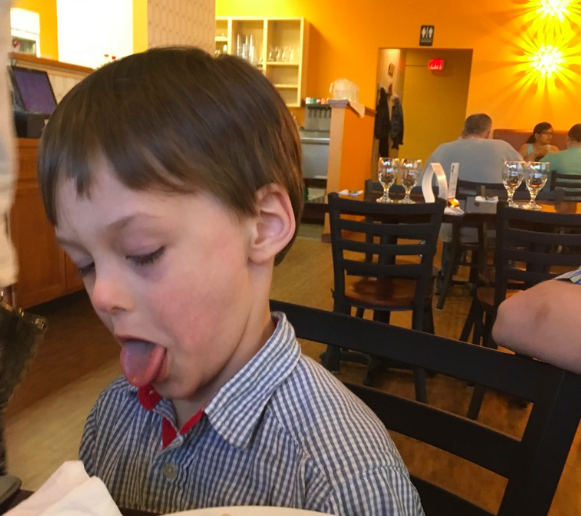They don’t think about it that way.
At least not until later, when pop psychology and also legit healing get going (just the healing everybody needs, a little ego-unwinding).
In the meantime, let’s not keep quizzing ourselves. With two little rules, and some unstructured listening, Awesome kid meet Awesome mom.
1. Listen more than talk.
2. Insist on respect and mutual kindness.
Listening
My children allow me to feel successful as a mom. They do this in spacious moments when everyday talk flows toward me and I don’t stop it.
I realized this the other day after twenty years of mistakenly imagining my kids were grading me. My tall twelve-year old son stood in the bedroom doorway talking about the presentation at school. He reflected on how there is the bully, the bullied, and the bystander. He said, “I’ve been a bystander many times. I decided now that I don’t have to wait things out. I’m here for a purpose.”
When he said that, I didn’t feel confirmed as a model mother. I melted in that he was growing in empathy. But I also intuited that his choice to be sincere in a specific son-mother relationship gives the relationship its content. There is form and content for everything in life. The form of the son-mother relationship is biological and includes duties carried out according to schedule. But the content must be sincerity and trust.
So, once I saw the spontaneous sincerity coming from my children, I began to notice that they meet me halfway. We are attuned to each other. They say thank you for little things and big things, too. They tell me “Everyone gets tired (or crabby) sometimes,” if I let on how I feel. This past week I have heard, “I love to give my love to you,” from my seven-year-old, and “That’s awesome, Mommy” from one in her twenties. I am so grateful for their strength and kindness.
Two Rules
I taught them a couple things when they were little which really pay off now. I taught, or rather insisted, on what we call “right-away-obedience” and also zero rudeness to parents or siblings. As I write that, I hear a voice telling me that “right-away-obedience” sounds very military and that “no rudeness” hints at shaming the natural expression of feelings.
I better explain for my own satisfaction that I’m not making my kids goose-step to my every whim or sending them to their rooms if they toss back a discreet eye-roll.
Sure, there’ve been notorious moments when blaming the kids for my discomfort led to ordering them around and dabbling in tyranny. Embarrassing.
My hierarchy rule (“right-away-obedience”) is for keeping them out of oncoming traffic. It also shortens the bedtime wrangle. They graduate from that rule as they begin to study and shower and complete homework with consistency. Meanwhile, it saves time and parent-numbing-down.
My civility rule (“no rudeness to parents or siblings”) is something they can graduate from also, but hopefully won’t. For years, they thought “Shut up!” was foul language. One family therapist put it this way, “in order for your kids to be truly free, you imposed some boundary, a safety net or stability so that they can be worry free and inherently know you got them. “
For this mini-society to work, I presuppose the parent has a sense of humor and tolerance, and even more, awe in the face of the small person with some of your traits. Something about this awe and creating life as you go along is found in the book Dharma Art. Dharma Art is a concept of creating that starts with not knowing what will appear in the space. The artist will try to be very open and innocent, receiving something natural from what first seems blankness. This is how a child and childhood come to us. Out of the vast nothing, a beginning is noticed. We can immediately impose our structure and colors on it. I do that. I like to put linen ties on my little boys and dresses with wooden buttons on the girls. But there is a wild and awesome other thing we get to do with kids, and that is sit back and watch the starlight flash in and around them.
https://www.elephantjournal.com/2017/07/waylons-mom-talks-about-buddhist-approach-to-art-in-halifax-canada/
They came fragile and wild into the world from the space I inhabit. I don’t want them hallooing constantly and making a Jackson Pollock exhibit of our house, so I fashion a couple rules. I am feeling a lightness in this mothering now as they bear the burdens of love and society along with me.
Bonus tip: Don’t take temporary pain personally.
As I keep hearing from spiritual teachers across the ages, pain can’t be avoided. Taking pain personally is what gives us difficulty.
Though I riff about gratitude for my children, they can police each other to tears, break bones climbing things I told them not to climb (the house), and leave the one good dinner I make uneaten. The frustration spirals in my chest and I hear myself stuttering questions in a high-pitched voice. There are sad days when teenagers have only snarky responses for whatever awkward parenting I’m trying to do. If it continues though, I remind them that I deserve a kind tone of voice. Even prickly or high-strung or depressed people can make the basic effort.
When I’m discouraged, I pause (or skid to a stop, as my friend Megan puts it). Then, listen with more than ears for the movement of relationship as it swells and subsides naturally. It is there. It does not have to be forced. Continue to offer the utmost respect and kindness. Trust yourself to impose boundaries, not out of reactivity, but out of a love which will be seen and known by those it touches.
https://www.elephantjournal.com/2018/11/the-art-of-skidding-by-megan-swan/


 Share on bsky
Share on bsky





Read 5 comments and reply